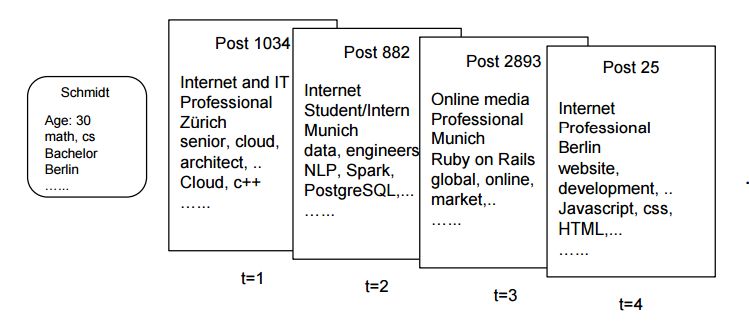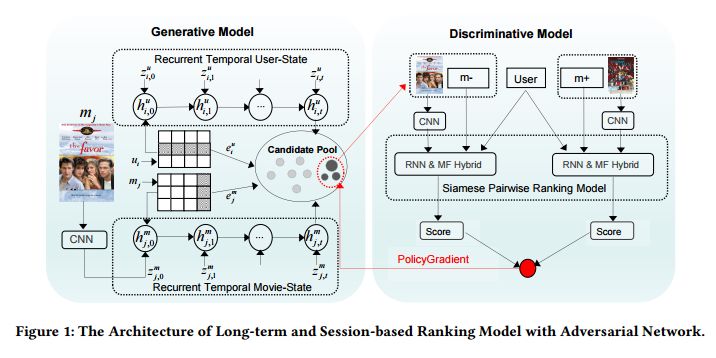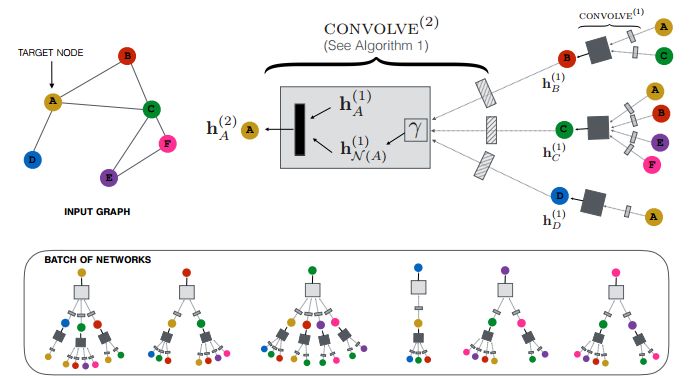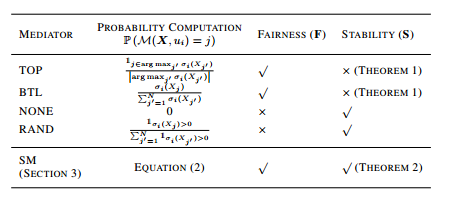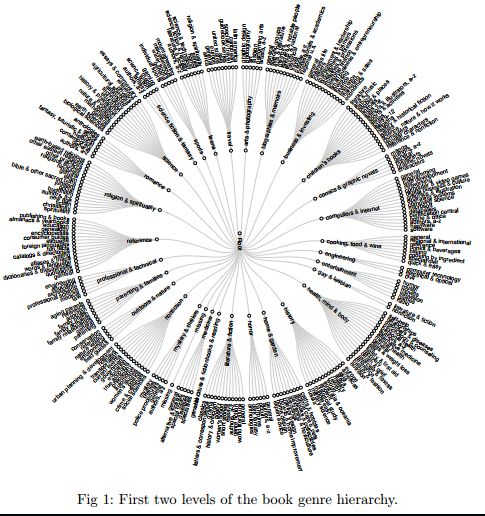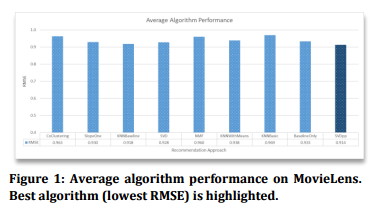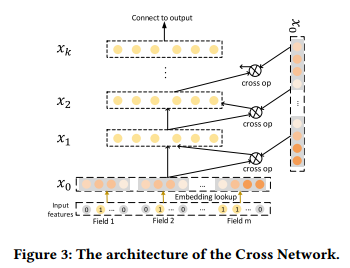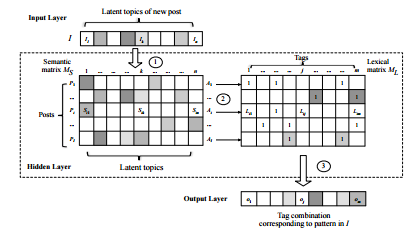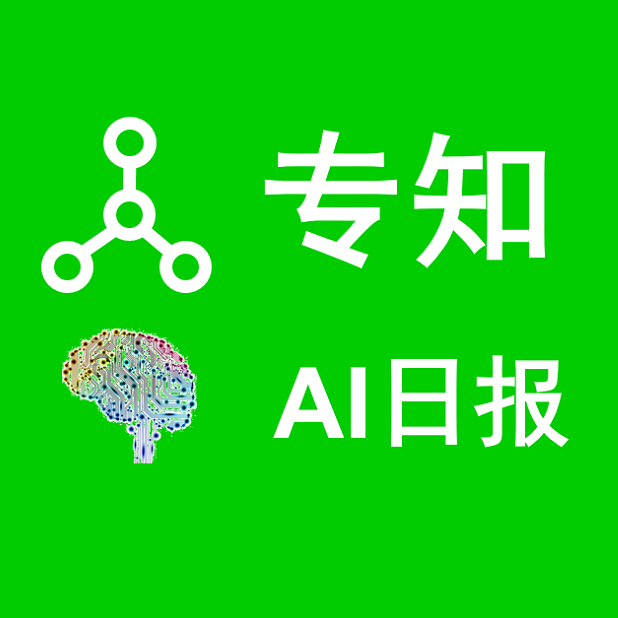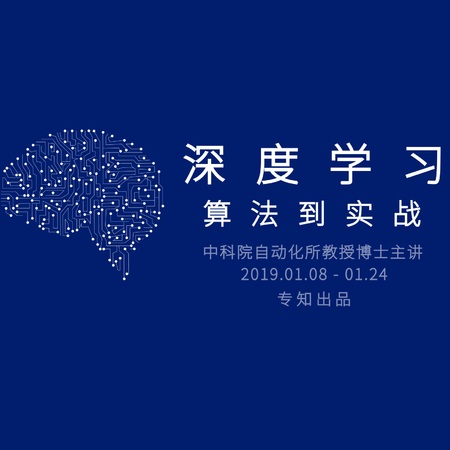【论文推荐】最新十篇推荐系统相关论文—内容感知、图卷积神经网络、博弈论、个性化排序、元学习、xDeepFM
【导读】专知内容组既前两天推出十六篇推荐系统相关论文之后,今天为大家又推出十篇推荐系统(Recommendation System)相关论文,欢迎查看!
17.A Sequential Embedding Approach for Item Recommendation with Heterogeneous Attributes(具有异构属性的商品推荐的序列嵌入方法)
作者:Kuan Liu,Xing Shi,Prem Natarajan
A shorter version appeared in ICDM 2017 SERecsys workshop
机构:University of Southern California
摘要:Attributes, such as metadata and profile, carry useful information which in principle can help improve accuracy in recommender systems. However, existing approaches have difficulty in fully leveraging attribute information due to practical challenges such as heterogeneity and sparseness. These approaches also fail to combine recurrent neural networks which have recently shown effectiveness in item recommendations in applications such as video and music browsing. To overcome the challenges and to harvest the advantages of sequence models, we present a novel approach, Heterogeneous Attribute Recurrent Neural Networks (HA-RNN), which incorporates heterogeneous attributes and captures sequential dependencies in \textit{both} items and attributes. HA-RNN extends recurrent neural networks with 1) a hierarchical attribute combination input layer and 2) an output attribute embedding layer. We conduct extensive experiments on two large-scale datasets. The new approach show significant improvements over the state-of-the-art models. Our ablation experiments demonstrate the effectiveness of the two components to address heterogeneous attribute challenges including variable lengths and attribute sparseness. We further investigate why sequence modeling works well by conducting exploratory studies and show sequence models are more effective when data scale increases.
期刊:arXiv, 2018年5月28日
网址:
http://www.zhuanzhi.ai/document/9e313df44c4e4ed910ff624abbf2eab9
18.Leveraging Long and Short-term Information in Content-aware Movie Recommendation(基于长短期信息的内容感知的电影推荐)
作者:Wei Zhao,Benyou Wang,Jianbo Ye,Min Yang,Zhou Zhao,Xiaojun Chen
机构:Zhejiang University,Shenzhen University,Pennsylvania State University
摘要:Movie recommendation systems provide users with ranked lists of movies based on individual's preferences and constraints. Two types of models are commonly used to generate ranking results: long-term models and session-based models. While long-term models represent the interactions between users and movies that are supposed to change slowly across time, session-based models encode the information of users' interests and changing dynamics of movies' attributes in short terms. In this paper, we propose an LSIC model, leveraging Long and Short-term Information in Content-aware movie recommendation using adversarial training. In the adversarial process, we train a generator as an agent of reinforcement learning which recommends the next movie to a user sequentially. We also train a discriminator which attempts to distinguish the generated list of movies from the real records. The poster information of movies is integrated to further improve the performance of movie recommendation, which is specifically essential when few ratings are available. The experiments demonstrate that the proposed model has robust superiority over competitors and sets the state-of-the-art. We will release the source code of this work after publication.
期刊:arXiv, 2018年5月2日
网址:
http://www.zhuanzhi.ai/document/f4b04f0446cf0498022cf1af59be464b
20.Graph Convolutional Neural Networks for Web-Scale Recommender Systems(基于图卷积神经网络的网络推荐系统)
作者:Rex Ying,Ruining He,Kaifeng Chen,Pong Eksombatchai,William L. Hamilton,Jure Leskovec
KDD 2018
机构:Stanford University
摘要:
Recent advancements in deep neural networks for graph-structured data have led to state-of-the-art performance on recommender system benchmarks. However, making these methods practical and scalable to web-scale recommendation tasks with billions of items and hundreds of millions of users remains a challenge. Here we describe a large-scale deep recommendation engine that we developed and deployed at Pinterest. We develop a data-efficient Graph Convolutional Network (GCN) algorithm PinSage, which combines efficient random walks and graph convolutions to generate embeddings of nodes (i.e., items) that incorporate both graph structure as well as node feature information. Compared to prior GCN approaches, we develop a novel method based on highly efficient random walks to structure the convolutions and design a novel training strategy that relies on harder-and-harder training examples to improve robustness and convergence of the model. We also develop an efficient MapReduce model inference algorithm to generate embeddings using a trained model. We deploy PinSage at Pinterest and train it on 7.5 billion examples on a graph with 3 billion nodes representing pins and boards, and 18 billion edges. According to offline metrics, user studies and A/B tests, PinSage generates higher-quality recommendations than comparable deep learning and graph-based alternatives. To our knowledge, this is the largest application of deep graph embeddings to date and paves the way for a new generation of web-scale recommender systems based on graph convolutional architectures.
期刊:arXiv, 2018年6月6日
网址:
http://www.zhuanzhi.ai/document/cc216511141943a919ae2b5dfe755781
21.A Game-Theoretic Approach to Recommendation Systems with Strategic Content Providers(战略内容提供者推荐系统的博弈论方法)
作者:Omer Ben-Porat,Moshe Tennenholtz
摘要:We introduce a game-theoretic approach to the study of recommendation systems with strategic content providers. Such systems should be fair and stable. Showing that traditional approaches fail to satisfy these requirements, we propose the Shapley mediator. We show that the Shapley mediator satisfies the fairness and stability requirements, runs in linear time, and is the only economically efficient mechanism satisfying these properties.
期刊:arXiv, 2018年6月5日
网址:
http://www.zhuanzhi.ai/document/8accf792096cd8c58fd7d6fb1d8a11eb
22.NeuRec: On Nonlinear Transformation for Personalized Ranking (NeuRec:关于个性化排序的非线性变换)
作者:Shuai Zhang,Lina Yao,Aixin Sun,Sen Wang,Guodong Long,Manqing Dong
Accepted at IJCAI 2018
机构:Nanyang Technological University,University of Technology Sydney,Griffith University,University of New South Wales
摘要:Modeling user-item interaction patterns is an important task for personalized recommendations. Many recommender systems are based on the assumption that there exists a linear relationship between users and items while neglecting the intricacy and non-linearity of real-life historical interactions. In this paper, we propose a neural network based recommendation model (NeuRec) that untangles the complexity of user-item interactions and establishes an integrated network to combine non-linear transformation with latent factors. We further design two variants of NeuRec: user-based NeuRec and item-based NeuRec, by concentrating on different aspects of the interaction matrix. Extensive experiments on four real-world datasets demonstrated their superior performances on personalized ranking task.
期刊:arXiv, 2018年6月3日
网址:
http://www.zhuanzhi.ai/document/0bb850d13e71d3dde94465234eead95d
23.Fitting a deeply-nested hierarchical model to a large book review dataset using a moment-based estimator (使用基于矩的估计器对大型书评数据集进行深度嵌套的层次模型拟合)
作者:Ningshan Zhang,Kyle Schmaus,Patrick O. Perry
机构:New York University
摘要:We consider a particular instance of a common problem in recommender systems: using a database of book reviews to inform user-targeted recommendations. In our dataset, books are categorized into genres and sub-genres. To exploit this nested taxonomy, we use a hierarchical model that enables information pooling across across similar items at many levels within the genre hierarchy. The main challenge in deploying this model is computational: the data sizes are large, and fitting the model at scale using off-the-shelf maximum likelihood procedures is prohibitive. To get around this computational bottleneck, we extend a moment-based fitting procedure proposed for fitting single-level hierarchical models to the general case of arbitrarily deep hierarchies. This extension is an order of magnetite faster than standard maximum likelihood procedures. The fitting method can be deployed beyond recommender systems to general contexts with deeply-nested hierarchical generalized linear mixed models.
期刊:arXiv, 2018年6月1日
网址:
http://www.zhuanzhi.ai/document/5952b33c1353b788d9f15711938d8b56
24.One-at-a-time: A Meta-Learning Recommender-System for Recommendation-Algorithm Selection on Micro Level (One-at-a-time: 微级推荐算法选择的元学习推荐系统)
作者:Andrew Collins,Joeran Beel,Dominika Tkaczyk
摘要:In this proposal we present the idea of a "macro recommender system", and "micro recommender system". Both systems can be considered as a recommender system for recommendation algorithms. A macro recommender system recommends the best performing recommendation algorithm to an organization that wants to build a recommender system. This way, an organization does not need to test many algorithms over long periods to find the best one for their particular platform. A micro recommender system recommends the best performing recommendation algorithm for each individual recommendation request. This proposal is based on the premise that there is no single-best algorithm for all users, items, and contexts. For instance, a micro recommender system might recommend one algorithm when recommendations for an elderly male user in the evening should be created. When recommendations for a young female user in the morning should be given, the micro recommender system might recommend a different algorithm.
期刊:arXiv, 2018年5月31日
网址:
http://www.zhuanzhi.ai/document/bc7250ef14696d42631b70c159b65cad
25.xDeepFM: Combining Explicit and Implicit Feature Interactions for Recommender Systems(xDeepFM: 结合显式和隐式特征交互的推荐系统)
作者:Jianxun Lian,Xiaohuan Zhou,Fuzheng Zhang,Zhongxia Chen,Xing Xie,Guangzhong Sun
机构:Beijing University of Posts and Telecommunications,University of Science and Technology of China
摘要:Combinatorial features are essential for the success of many commercial models. Manually crafting these features usually comes with high cost due to the variety, volume and velocity of raw data in web-scale systems. Factorization based models, which measure interactions in terms of vector product, can learn patterns of combinatorial features automatically and generalize to unseen features as well. With the great success of deep neural networks (DNNs) in various fields, recently researchers have proposed several DNN-based factorization model to learn both low- and high-order feature interactions. Despite the powerful ability of learning an arbitrary function from data, plain DNNs generate feature interactions implicitly and at the bit-wise level. In this paper, we propose a novel Compressed Interaction Network (CIN), which aims to generate feature interactions in an explicit fashion and at the vector-wise level. We show that the CIN share some functionalities with convolutional neural networks (CNNs) and recurrent neural networks (RNNs). We further combine a CIN and a classical DNN into one unified model, and named this new model eXtreme Deep Factorization Machine (xDeepFM). On one hand, the xDeepFM is able to learn certain bounded-degree feature interactions explicitly; on the other hand, it can learn arbitrary low- and high-order feature interactions implicitly. We conduct comprehensive experiments on three real-world datasets. Our results demonstrate that xDeepFM outperforms state-of-the-art models. We have released the source code of xDeepFM at \url{https://github.com/Leavingseason/xDeepFM}.
期刊:arXiv, 2018年5月30日
网址:
http://www.zhuanzhi.ai/document/36cc30b55d49f42f1529b19a3279ab3d
26.Modeling Cognitive Processes in Social Tagging to Improve Tag Recommendations(对社会标签中的认知过程进行建模以改进标签的推荐)
作者:Dominik Kowald
PHD-Symposium paper @ WWW2015
机构:Graz University of Technology
摘要:With the emergence of Web 2.0, tag recommenders have become important tools, which aim to support users in finding descriptive tags for their bookmarked resources. Although current algorithms provide good results in terms of tag prediction accuracy, they are often designed in a data-driven way and thus, lack a thorough understanding of the cognitive processes that play a role when people assign tags to resources. This thesis aims at modeling these cognitive dynamics in social tagging in order to improve tag recommendations and to better understand the underlying processes. As a first attempt in this direction, we have implemented an interplay between individual micro-level (e.g., categorizing resources or temporal dynamics) and collective macro-level (e.g., imitating other users' tags) processes in the form of a novel tag recommender algorithm. The preliminary results for datasets gathered from BibSonomy, CiteULike and Delicious show that our proposed approach can outperform current state-of-the-art algorithms, such as Collaborative Filtering, FolkRank or Pairwise Interaction Tensor Factorization. We conclude that recommender systems can be improved by incorporating related principles of human cognition.
期刊:arXiv, 2018年5月30日
网址:
http://www.zhuanzhi.ai/document/d33d933064d5bf0637f6420abc12b065
-END-
专 · 知
人工智能领域26个主题知识资料全集获取与加入专知人工智能服务群: 欢迎微信扫一扫加入专知人工智能知识星球群,获取专业知识教程视频资料和与专家交流咨询!
请PC登录www.zhuanzhi.ai或者点击阅读原文,注册登录专知,获取更多AI知识资料!
请加专知小助手微信(扫一扫如下二维码添加),加入专知主题群(请备注主题类型:AI、NLP、CV、 KG等)交流~
请关注专知公众号,获取人工智能的专业知识!
点击“阅读原文”,使用专知
